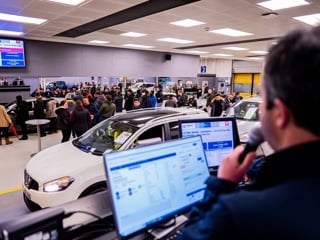The future of Carillion’s fleet management division hangs in the balance, after the official receiver said its number one priority was securing the best price for assets so creditors can be paid.
Managing more than 10,000 vehicles, which includes an internal fleet of 3,000-plus cars, vans and trucks, it is one of the largest fleet services companies in the UK.
But, after its parent company collapsed owing approximately £1.5 billion, there is concern that a fire sale of any vehicle assets could have a negative impact on residual values (RVs).
PricewaterhouseCoopers (PwC) has been appointed by the courts to act on behalf of the official receiver and handle the liquidation of Carillion’s assets.
An advert on Gumtree suggests that vehicles from its internal fleet are already being offloaded. It says that more than 100 “repossessed” Carillion vans are being sold by commercial vehicle dealer The Yard Group, in County Antrim, Northern Ireland.
The listing refers specifically to a five-year-old Ford Transit which is part of a “massive range” of Carillion vehicles available.
Ken Brown, editor of Red Book LCVs and Motorhomes at Cap HPI, told Commercial Fleet: “It is difficult to say if the collapse of Carillion will affect the used LCV markets as it is still early days. However, if large volumes of vehicles are going to return to the market in a short space of time they may well have a negative impact on current values.
“It all depends of course on what they are and when they are returned. Sometimes an influx of certain models that are in short supply can not only be timely but also good for the market as a whole.”
Martin Saxton, transport manager at Carillion, did not respond to a request from Commercial Fleet for further information on the fleet operation’s future.
Writing on LinkedIn, he instead paid tribute to colleagues: “Very sad times for a company that I have had the honour to work at for almost 28 years. In that time, the professionalism of all I have had the pleasure to work for, and with, has been outstanding. I would like to wish my many friends the very best of good fortune for the future.”
The Government has stepped in to support the parent company’s contracts with the public sector, where some of Carillion’s fleet would have been deployed.
Meanwhile, other private sector companies involved in joint contracts with the firm have taken overall control, ensuring work continues.
The construction and property development group Kier, for example, has been working with Carillion on joint venture projects like HS2 and smart motorways and has offered to employ 150 staff, as well as seven apprentices from Carillion. However, it declined to say whether they would also be taking on vehicles used in relation to those projects.
Galliford Try and Balfour Beatty have also offered to take on 76 Carillion employees that were jointly working with them on the £550m Aberdeen bypass scheme. A spokesman for Galliford Try also would not comment on the status of any related vehicles.
In terms of Carillion Fleet Management (CFM), staff were still answering the phones at the Wolverhampton-based firm in the wake of the collapse, but were remaining tight-lipped about the business.
It had been a profitable subsidiary for Carillion. In CFM’s last published accounts, for the year ending December 31, 2016, pre-tax profit increased from £12.6m to £15.9m. Turnover was also up, 8% year-on-year, from £38m to £41m, while net assets stood at £11.8m.
The annual report said the increase in turnover was due, in part, to an increase in volumes from other Carillion subsidiaries.
In fact, it says that the majority of its turnover was with those subsidiary companies, as a result of it being group policy to use CFM as sole supplier.
It could mean that there is, effectively, no fleet management business to sell if its customer base faces a similarly uncertain future.
An industry source told Commercial Fleet he thought it highly unlikely CFM would be acquired by another company within the UK fleet industry.
He said: “If we were looking to acquire the business we would want full disclosure on all the vehicles, where the liability lies with each vehicle, where they are in each contract.
“We might not be buying any profit but we would be buying their customers. My feeling is that it will all be in such a muddle that any other business is going to run a mile rather than want to get involved.”





















Login to comment
Comments
No comments have been made yet.